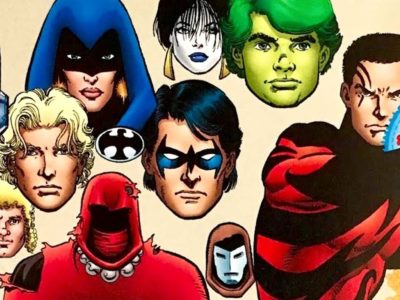
[ad_1]
Although he’s best known for his ability to regenerate from even the most severe of injuries, Deadpool’s might just be his brutal honesty.
Although he’s best known for his ability to regenerate from even the most severe of injuries, Deadpool’s might just be his brutal honesty. While many of the Marvel Universe’s other heroes usually try to uphold some semblance of decorum, Deadpool has never been afraid to speak his mind and his complete lack of tact gives him the unique ability to cut straight to the heart of a controversial issue and deliver harsh but honest criticism of individual heroes, the larger superhero community, and even the trends of the comic book industry as a whole.
During Civil War (by Mark Miller and Steve McNiven), many of Marvel’s heroes underwent a dark shift in character that was reflected in dramatic costume changes and radical alterations to their personalities, and Deadpool spent much of the crossover event mocking how “mature” the Marvel Universe had suddenly become. One of the primary targets of Deadpool’s ridicule was Speedball, the former leader of the New Warriors, who’d taken on a new, darker identity as the anti-heroic Penance following the tragedy that led to the passage of the Superhero Registration Act. Deadpool’s brutal (yet hilarious) criticism of Penance not only proves how surprisingly insightful the Merc With the Mouth can be but serves as a reminder that a darker aesthetic doesn’t equal maturity.
In an attempt to boost the ratings of their reality television show, Speedball and the New Warriors attempted to take on a group of powerful villains hiding out in the small town of Stamford, Connecticut, resulting in a battle that killed over 600 innocent civilians and the subsequent passage of the Superhuman Registration Act. Tormented by guilt, Speedball abandoned his old costume and took on the moniker of Penance, commissioning a suit of armor equipped with 600 interior needles that kept him in a constant state of pain and replacing his once optimistic demeanor with a grim disposition. While many other heroes were horrified by Speedball’s transformation, Deadpool, currently serving as a member of the Great Lakes Initiative, wasted no time making fun of him in Deadpool/GLI – Summer Fun Spectacular‘s “Squirrel Girl Interludes” (by Fabian Nicieza, Dan Slott, Kieron Dwyer, Pete Pantazis, and Dave Lanphear).
While Deadpool himself doesn’t directly interact with Penance within the issue, he doesn’t show him any sympathy, writing him off as an overly-dramatic poser trying to cash in on a popular trend. Unable to accept what he’s become, Squirrel Girl, Penance’s former love interest, infiltrates Thunderbolt Mountain and attempts to convince him to abandon his new persona and return to his former identity. After a few futile attempts to convince her that this is his way of atoning for his crimes, he finally admits that he became Penance to try and become a “deeper” character, completely validating Deadpool’s opinion on the ex-New Warrior.
Given the questionable continuity of “Squirrel Girl Interludes” and Squirrel Girl’s other fourth-wall-breaking adventures, Penance’s admission is more than likely an in-universe joke and not a true revelation about his character. However, the incident does serve as proof of how ineffective the practice of turning “bright” heroes into darker and more serious characters can be. For many years, comics have been stereotyped as children’s literature by those unfamiliar with the genre, and many writers and artists have sought to challenge that perception by incorporating darker thematic elements into their stories. This has resulted in many optimistic and colorful heroes like Speedball undergoing a radical transformation that changes them into darker and more angst-driven characters.
Unfortunately, while this approach has sometimes resulted in characters like Rocket Racoon and Howard the Duck being upgraded from joke characters to well-respected heroes, it’s also resulted in many heroes making bizarre choices or undergoing extreme trauma in an attempt to justify the sudden shift in their characters. The trials and tribulations that Spider-Man endured during the infamous Clone Saga were the direct results of the desire to make one of their more child-friendly heroes more mature. However, the result only succeeded in alienating long-time readers due to the many convoluted twists and turns that the series took as it was drawn out over two years.
During the era of Civil War, many characters underwent similar ordeals as the Marvel Universe moved in a more “mature” direction, but this resulted in long-time heroes like Iron Man, Mr. Fantastic, and Captain Marvel making controversial decisions that would impact their perception among comic fans for years to come. Ironically, by staying true to his irreverent and cartoonish self, Deadpool ended up being one of the few characters who emerged from this era with his reputation and popularity unscathed. In contrast, Penance and many other “edgy” characters like him have faded into obscurity, proving that staying true to a character’s true personality makes them stronger.
About The Author
[ad_2]






